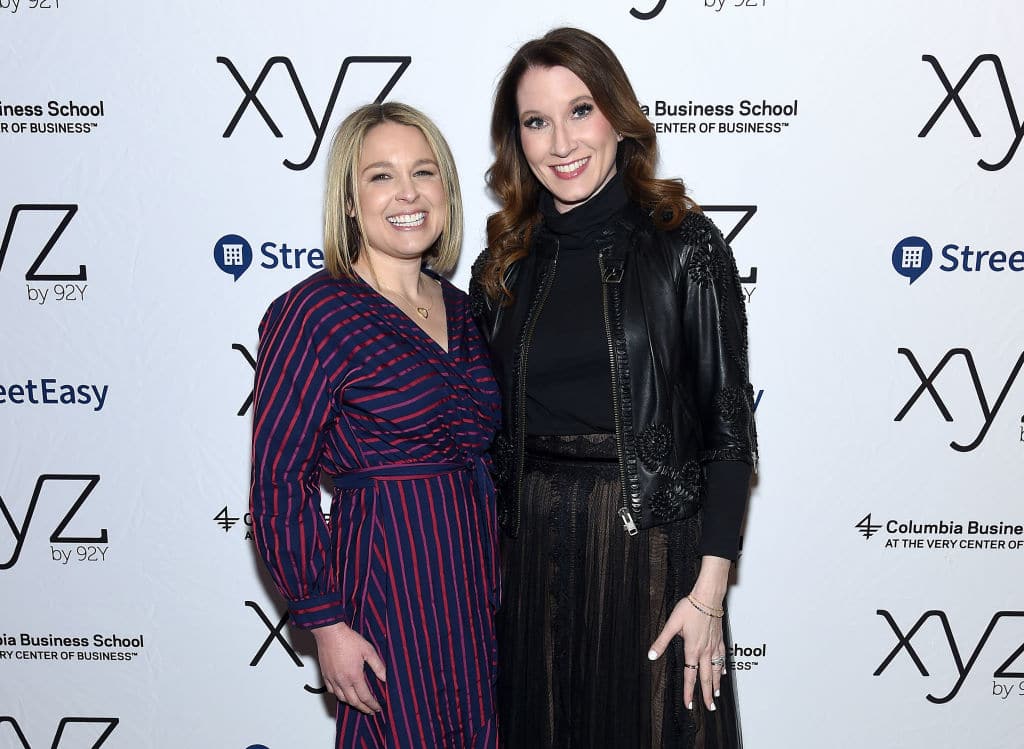 Joanna Teplin and Clea Shearer attend “The Home Edit: Clea Shearer And Joanna Teplin In Conversation With Joanna Goddard” at 92nd Street Y on March 18, 2019 in New York City. (Photo by Jamie McCarthy/Getty Images)
Joanna Teplin and Clea Shearer attend “The Home Edit: Clea Shearer And Joanna Teplin In Conversation With Joanna Goddard” at 92nd Street Y on March 18, 2019 in New York City. (Photo by Jamie McCarthy/Getty Images) Despite my appreciation for the ideal of a tidy home, I never fell under the spell of the decluttering guru and cultural phenomenon Marie Kondo. At least 11 million people who bought her book disagreed with me and sparked joy by parting with extraneous belongings. Luckily (or unluckily) for me, my heart still rejoices when I peruse saved letters from former students or decades-old challah covers with the painted toddler handprints of my now college-age children.
However, six months into the pandemic, my shelves and kitchen cabinets have experienced a fair amount of weight gain: clothes, sports equipment, books, dog toys and “junk.” It was time for the house to slim down.
Eager to learn from others, I watched “Get Organized with The Home Edit” on Netflix. Organizers Clea Shearer and Joanna Teplin run their own business, and the series features them making clutter vanish for both celebrities and ordinary folks. The episodes follow the team as they transform closets and garages into attractive and workable spaces by putting the saying, “A place for everything, and everything in its place” into action.
I almost turned off the program when they began categorizing books according to the color of their covers. Yet the unbridled enthusiasm these professionals exude reminds me of my own joyful reaction to hoped-for positive pregnancy tests years ago. These people really love their work.
https://www.instagram.com/p/CFspUzdBvwx/?utm_source=ig_web_copy_link
As a rabbi, I appreciated that the first season of “The Home Edit” dropped about a week before Rosh Hashanah. While Passover is the springtime holiday most closely associated with home cleaning and organizing (the word seder literally translates as “order”), I found the timing to be just right. Shearer and Teplin encourage their clients to articulate practical goals, purge unnecessary detritus, take stock of familiar spaces with fresh eyes and, above all, not jam all their accessories into a junk drawer.
These lessons apply to straightening up a physical space as well as a human soul.
Television loves a great makeover show. Who doesn’t feel a twinge of satisfaction when a shabby and messy room is transformed into a sparkling oasis by a fairy godmother’s magic wand (or, in this case, plastic bins)? With external and physical changes, the subjects of these makeovers might now experience newly acquired confidence, calm and fulfillment — or so the television producers would like us to believe.
As a rabbi, I appreciated that the first season of “The Home Edit” dropped about a week before Rosh Hashanah. While Passover is the springtime holiday most closely associated with home cleaning and organizing (the word seder literally translates as “order”), I found the timing to be just right.
Rosh Hashanah pops up at the start of the seventh Hebrew month and offers us the opportunity to make over our spiritual selves in the midst of our own messes and busy lives. Rather than edit our living spaces, we seek to revise our inner lives. We don’t have a team of professional organizers carting in elegant boxes and fancy labels with bespoke blue calligraphy to convert our closets into inner sanctums of tranquility. But we do have thousands of years of tradition, prayers and music reminding us that improvement is not only possible but also necessary for our survival.
Following Shearer and Teplin’s template for change, at the start of the Jewish New Year, we first come up with some goals: to become more patient with our children and partner? To learn a new skill? To take more time to listen to others and less time to talk? Then, we categorize, contain and make tough choices. What behaviors should we hold on to for 5781 and which ones need to be put to rest, or at least out of sight and into storage?
May we fill the spaces in our hearts and between us and others with peace, happiness, blessing and compassion. That’s a home improvement that can start now or at any time. No plastic products required.
Rabbi Sharon G. Forman is the author of “The Baseball Haggadah: A Festival of Freedom and Springtime in 15 Innings” as well as numerous essays about Judaism, education and parenting. She lives in Westchester County, N.Y., with her husband and three children.






















 More news and opinions than at a Shabbat dinner, right in your inbox.
More news and opinions than at a Shabbat dinner, right in your inbox.